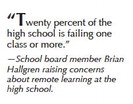Board members questioned if the ….
Board members questioned if the days would be made up later in the year. Sullivan explained that with the waiver the district received on the minutes of instruction due to the pandemic, they are allowed to make changes like this without needing to make up the time. Sullivan noted that unlike some districts in the region that are on four-day a week schedule Medford has maintained its five-day schedule and would like to be able to continue that.
Board member Brian Hallgren agreed saying that the public is very appreciative of remaining at five days a week. He praised the school administration, staff and teachers for the “tremendous job” they have done so far this year. He said he supported taking the opportunity to give them a break and hopefully continue keeping the schools open full weeks.
“I am not opposed to this, but is it short notice for parents?” asked board member Dede Strama.
Board president Dave Fleegel was also hesitant about expanding Thanksgiving break, noting that there are already 3.5 days off that week and that it would be losing a day and a half of instruction time.
Typically the district sees a higher absentee rate on those shortened days as many older students take part in the annual gun deer season which runs that week. Sullivan said this is mainly felt at the high school and into the middle school, but less at the elementary school. “There aren’t as many deer hunters in kindergarten,” Sullivan said.
Board member Steve Deml said he was on the fence on the question with concerns about childcare and wondering if they would regret not having that instruction time later. “I am sure some parents don’t have a lot of options,” he said of the need to line up child care.
Sullivan said building principals have been able to juggle having staff missing due to quarantines, but it is a challenge. “It would be two less days we would be trying to piecemeal a staff together,” he said. Board member Cheryl Wibben asked what percentage of teachers continued to teach while quarantined.
“A very high percentage,” Sullivan said, noting that one of the issues is still needing an adult in the classroom if the teacher is out.
“We are are talking a day and half, it is not like we are talking a week here,” Hallgren said, noting that while granting additional time off may not help the district stay in school five days a week, it wouldn’t hurt those efforts.
“I don’t think it will make that big of a difference,” Wibben countered. Board member Barb Knight also raised concerned about the additional strain it would put on families.
In the end, board members voted 6 to 2 with Paul Dixon absent to approve the additional vacation days. Fleegel and Wibben were opposed.
Virtual learning
As part of the Medford school district’s response to COVID-19, the district gave families the option of taking part in virtual learning rather than going to school buildings.
Now, faced with academic ineligibility rates double what is normal this time of year, administration is questioning if that was a wise choice. Sullivan said the message he received from this is clear that when this is all over, Medford will remain a brick and mortar school district with emphasis on in-person instruction and leave virtual instruction to the Rural Virtual Academy.
According to high school principal Jill Lybert, the high school has 175 remote learners, with another 50 students and five staff out on quarantine. She said the quarantine numbers fluctuate daily. As part of the virtual learning, students are expected to log in each hour and take part in the classrooms. While some are doing this, many are not. She said this is reflected in the ineligibility list for the first quarter showing 187 kids are currently ineligible with 100 to 120 of them from the remote learners group. Typically the ineligibility list has about 90 students on it at this time of the school year. Under the district’s co-curricular code, students are ineligible for extra curricular activities if they have a failing grade in a class.
“There is little response from our intentional non learners,” Lybert said, explaining that teachers and administration have been attempting to contact families where remote learning isn’t working. She said in many cases these students would be caught earlier if they were falling behind in the classroom.
Sullivan said that in some instances they are contacting families and asking them to strongly reconsider virtual learning because it is not working for them.
That said, Sullivan said it is working for others. He noted the large number of student athletes who took part in remote learning in order to reduce the possibility of being benched due to contact tracing quarantines.
Fleegel agreed and noted that parents need to be involved in order to make virtual learning work.
Hallgren said students need a wake up call cautioning that if the virtual option isn’t working, the district may need to take it away. “Twenty percent of the high school is failing one class or more,” Hallgren said, cautioning the students to not mess up the opportunity they have been given.
RVA administrator Charlie Heckel cautioned that one of the major challenges is that the district is calling on teachers to teach in two modes of instruction at the same time.
“We are asking almost the impossible out of our teachers,” Heckel said, noting that teaching both in person and virtual classes at the same time all day is a lot to ask for and it is far from easy.
In other business, board members: Received an update in summer school. Attendance was down this year due to COVID-19 concerns especially with limits on in-person use of the schools in June. The district can count a portion of each student in the summer school program toward its overall student enrollment. The district had 17 full time equivalents (FTE), from the summer school which, while it was down signifi cantly from the year before was close to historical levels. Board members expressed hope the numbers would rebound following the pandemic.
In other business, board members:
_ Received word that free breakfast and lunch for all district students would continue through the end of school year. It had originally been scheduled to end in January, but was extended to assist families during the ongoing pandemic.
_ Approved moving the November board meeting to Nov. 30 and the December board meeting to Dec. 21.
_ Approved on second reading, policies related to participation of non-public school students in district courses; assignment of students to schools; assignment of students to classes; release time for religious instruction; student rights and responsibilities and canine searches. These were all existing polices that were just under regular review.
_ Approved the RVA annual operating budget. This is the policy that establishes the RVA’s operational budget and the agreement between it and the participating schools. Under the agreement, the amount of open enrollment revenue that Medford is able to retain for administrative expenses was increased from 5% to 6%. According to Heckel, many of the other changes were to clean up language to match what policy states to actual practice.
—Pat Sullivan, district administrator about the impact of teachers and students going out on quarantine.
“T wenty percent of the high school is failing one class or more.”
—School board member Brian Hallgren raising concerns about remote learning at the high school.
“T his









